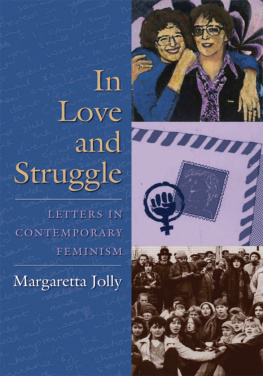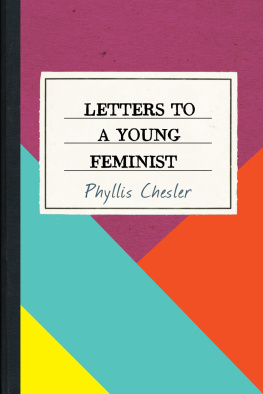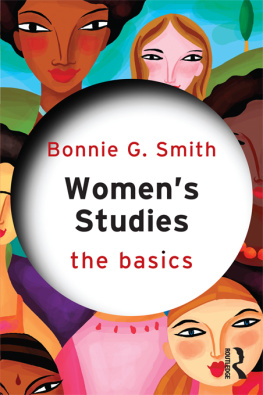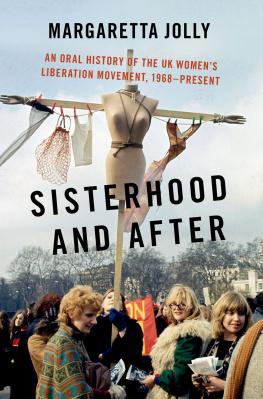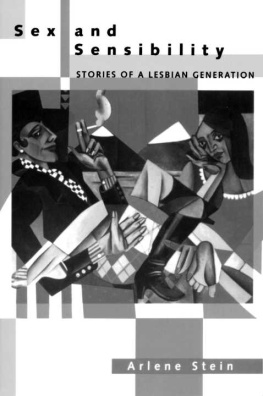The correspondences I enjoyed in researching this book were an education of their own in helping me to understand just how complex and sensitive the world of letter-writing can be. I thank all the women and men who were so generously willing to share their accounts of the life of political change. Some I only know by first name and others have wished to remain anonymous. I particularly thank S, Lise, Kevin Littlewood, Carole Harwood, Karen Payne, Kate, and Wendy Harcourt for their dialogues with me and for their permission to share their dialogues with others. Others who were especially helpful were Eileen Bower, Sasha Roseneil, Sabine Erika, Charlotte Bunch, Lee Waldorf, Roxanna Carillo, Noeleen Heyzer, Fatma Alloo, Gillian Youngs, David Morgan, Alice Cook, Juley Howard, Ginette Leach, Millie Oliver, Elizabeth Barakah Hodges, and Ann Pettit.
The following people were also important in offering sources and ideas: Penny Lowery, Julia Watson, Caiea March, Gill Branston, Melissa Hardie, Di Parkin, Claire Grey, Daphne Kingdom, Jill Golden, Laura Potts, Jill Dawson, Jan Montefiore, Anna Holmes, Margery Lewis, Nicky Hallett, Charmion Cannon, Sarah Hipperson, Carole Stibbs, Ilona Singer, Ann Kalowsi-Naylor, Diane Middlebrook, Laura Gowing, Raida Al-Zubi, Odine de Guzman, Cynthia Huff, Zohl de Ishtar, Jenny Maxwell, Helen Buss, Gwyn Kirk, Laura Ahearn, Louise Krasniewicz, Nicole Constable, Kay Turner, Jana Runnalls, Helen John, Joan Nestle, Ruth Rosen, and Clare Brant. Members of the International Auto/Biography Association, Womens Studies Network UK, and Older Feminists Network also kindly gave time and effort to help my research. My apologies to any I may have forgotten and my thanks to some very helpful people who have chosen to remain anonymous.
I should like to thank several librarians and archivists for their care. The staff at the Lesbian Herstory Archives were wonderfully generous and I especially acknowledge Deborah Edel for her kindness. Jane Hargreaves at the Feminist Archive (South) has been keeping the place alive and kept me so, too. The Schlesinger Library at Radcliffe College provided a fabulously organized atmosphere. Kathryn Jacob, assistant curator at the Schlesinger Library, kindly let me interview her about the problems of donors. Jacalyn R. Blume was very helpful in guiding me through the papers of the Womens Encampment for a Future of Peace and Justice, and Sarah Hutcheon, in advising on my visit generally. Amy Hague, curator of manuscripts at the Sophia Smith Collection at Smith College and Susan Edwards at the Glamorgan Records Office in Cardiff, were also welcoming. The Womens Library at London Metropolitan University was a treat, and Teresa Dohertys comments as head of Special Collections eye-opening. Dorothy Sheridan at the Mass-Observation Archive remains an archivist friend of distinction. Jessica Gardner, head of Special Collections at the University of Exeter, I cannot thank enough for her professional help as well as loveliness as a friend.
I thank members of the Department of English, University of Exeter, for general support: Ashley Tauchert and Helen Hanson offered stimulating comments on drafts; Tony Da Silva was a kindred spirit in life writing; and Helen Taylor was quietly encouraging throughout. Teachers and colleagues who have been formative in my thinking about letters and life history include Janet Gurkin Altman, Philippe Lejeune, Dorothy Sheridan, Laura Marcus, Treva Broughton, Julia Swindells, Tom Couser, Paul John Eakin, Liz Stanley, Terry Castle, Jenny Bourne Taylor, and Jenny Shaw.
Nancy Miller and Victoria Rosner, editors of the Columbia University Press Gender and Culture series, were fantastically inspirational and stylish guides, who saw what I was trying to do and made me do it better. I also warmly thank Jennifer Crewe, Michael Haskell, Clare Wellnitz, and Afua Adusei at the Press, as well as the anonymous readers of the manuscript, for such careful suggestions.
I give special thanks to friends: Jay Prosser for loving and inspirational conversations, Niamh Moore for ecofeminism and reading drafts, Jacquetta Morris for making me laugh and write better, Clare Benjamin for thinking so interestingly about relationships, Sheila Hamilton for her encyclopedic memory, Anna T for talking politics with me, Anne Nyssen for being more revolutionary than I could ever be, Gwyn Lewis and Shau Lan Chan for their loyalty, Lisa Freedman for her eloquence, Christine Edwards, Faith Mosley, Isanna Curwen, Brenda Whisker, and Xiao Pe He for womens love, Margaret Nairn for being such a faithful correspondent, Sue Teddern for being able to write situation comedy, and Craig Howes for making conferences such fun. Nick Fairclough has been a sparkling joy in life as well as writing.
My thanks, finally, go to my family, especially my parents, Richard and Alison Jolly, for always being there, for keeping me strong, not to mention reading more drafts than I could dare to expect.
This research was funded in part by the Arts and Humanities Research Council, the British Academy, and the Department of English, University of Exeter, for which I am deeply grateful.
I have tried assiduously to contact every source, and to obtain copyright permission. If at the time of publication it has not been possible to trace any authors cited, I would be pleased to hear from them. I very gratefully acknowledge permission to include brief extracts from the following people:
Laura Agustn, for permission to quote from an e-mail to Women on the Net, quoted in Wendy Harcourt, Cyborg Melody: An Introduction to Women on the Net (Won), in Women@Internet: Creating New Cultures in Cyberspace, ed. Wendy Harcourt (London: Zed Books, 1999), 120.
Fatma Alloo, for permission to quote from an e-mail to Women on the Net, quoted in Wendy Harcourt, Cyborg Melody: An Introduction to Women on the Net (Won), in Women@Internet: Creating New Cultures in Cyberspace, ed. Wendy Harcourt (London: Zed Books, 1999), 120.
Eileen Bonner, for permission to quote from personal interview, September 2002, and from an unpublished letter to lover, August 1982, Bonners personal collection.
Alison Burns, for permission to quote from an unpublished letter to Nan Talese, 9 November 1982, Karen Payne personal papers.
tatiana de la tierra, for permission to quote from a letter dated 6 March 1994, published in Kay Turner, Between Us: A Legacy of Lesbian Love Letters (San Francisco: Chronicle Books, 1996).
John Wenger Berquist DeHority, for permission to quote from an unpublished Epistle to the Peace Encampment, 15 July 1983, Womens Encampment for Peace and Justice Collection, box no. 4, folder 107, Schlesinger Library, Radcliffe Institute, Harvard University, Cambridge, Mass.
Sabina Erika, for permission to quote from personal interview, September 2002.
Roy Fuller, for permission to quote from War Letters, quoted in Ronald Blythe, ed., Private Words: Letters and Diaries from the Second World War (1991), 2nd ed. (London: Penguin, 1993).
Gillian E. Hanscombe, for permission to quote from Between Friends (Boston: Alyson, 1982; London: Sheba Feminist Publishers, 1983; London: Womens Press, 1990).
Wendy Harcourt, for permission to quote from Cyborg Melody: An Introduction to Women on the Net (Won), in Women@Internet: Creating New Cultures in Cyberspace, ed. Wendy Harcourt (London: Zed Books, 1999), 120.
Wendy Harcourt, for permission to quote from an unpublished e-mail to Kekula Bray-Crawford, 6 February 1998, personal archives of Wendy Harcourt.
Carole Harwood, for permission to quote from personal interview, 20 May 2003; from an unpublished letter to the author, 21 January 2003.
Xiao Pei He, for permission to quote from an unpublished e-mail to Susan Jolly, 18 March 2004.

